On January 4, Mexican authorities arrested Ovidio Guzman Lopez, son of notorious drug cartel leader “El Chapo”. Lopez’ cartel reacted violently, blocking highways, torching vehicles, shooting at civilian airplanes. In the following clashed, 29 people lost their lives according to Mexico’s Minister of Defense.
On January 8, U.S. President Joseph Biden arrived in Mexico to attend the trilateral North American summit together with Canada.
Nearly everyone in Mexico thinks that the U.S. and narco are connected. Mexican opposition claims the arrest was a gift from the Mexican government to Biden ahead of the trip.
Rafael Barajas Durán rejects with the following comic the claim of a gift – but agrees fully there is a connection between the United States of America and Mexico’s drug and cartel problem.
Barajas responded with the following cartoon.
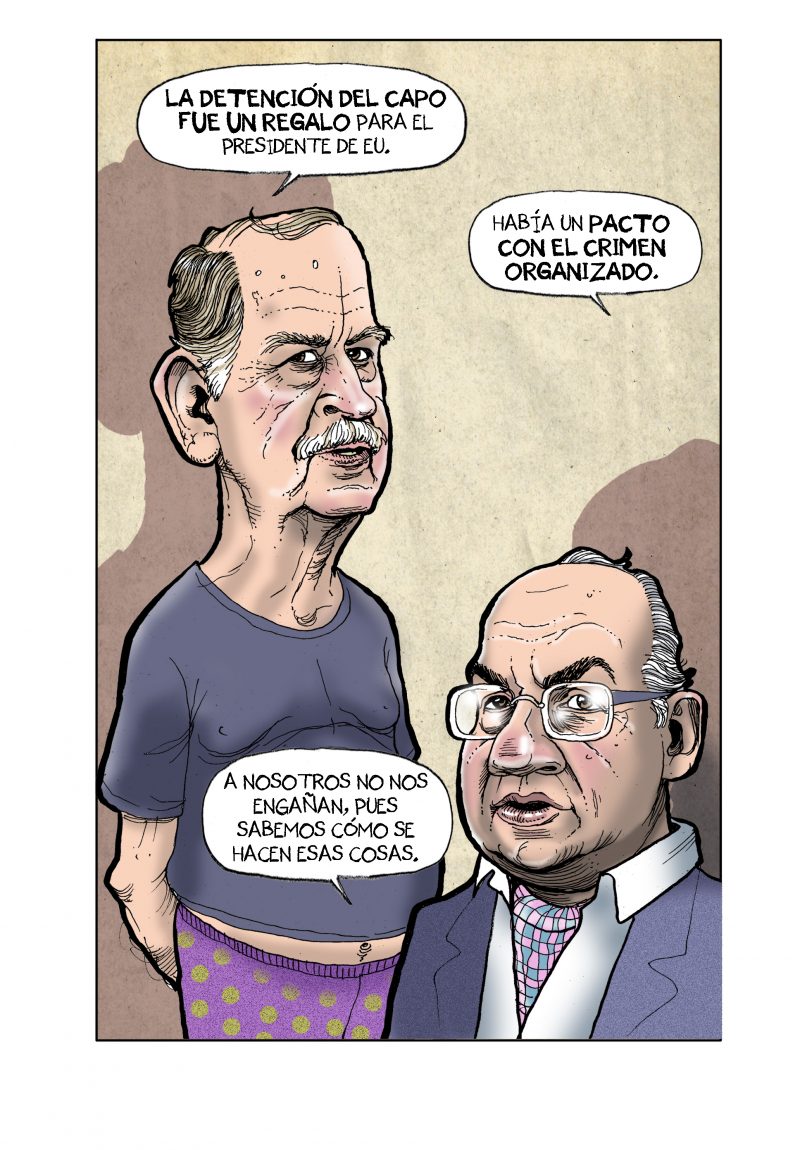
On the left, former right-wing President of Mexico, Vicente Fox: – The detention of the cartel boss was a gift to the U.S. President.
On the right, former right-wing President of Mexico, Ernesto Zedillo: – They will not cheat on us. We know very well how these things are done.
Rafael Barajas Durán is better known as El Fisgón. Since the 1980s, he has been working as a political cartoonist. He has published several books with political caricatures. He publishes frequently in Mexico’s leading daily newspaper La Jornada.
Since 2018, Barajas is also President of the National Institute for Political Education (INFP). Part of MORENA, Mexico’s governing party, the INFP is responsible for political education of both party members and the general public, at the same time contributing to MORENA’s political theory and strategy development.
The INFP emphasizes that the Fourth Transformation, the title of President López Obrador’s political program, includes a transformation of consciousness” – and dedicated itself to that.
The Spanish newspaper El Pais describes Barajas as one the “friends, but very close friends” of Mexico’s President – third from left on the tweet below. On his right side is Rafael Barajas. (And on his right, Pedro Miguel, with whom I have also had the honor to talk – to be published soon)
I spoke with Rafael Barajas in Mexico City. We started our conversation with the topic of drug trafficking, a focus of international press on Mexico – and an area of expertise for Barajas. One of his books with political cartoons is titled “Narcotráfico para inocentes: El Narco en México y quién lo U.S.A” – Drug trafficking for the innocent: The Narco in Mexico and who USes it”.
The second part of the interview deals with the Fourth Transformation and why the nation-state is the primary line of defense. In the third and final part, we discussed Mexican President López Obrador’s controversial proposal to establish a free trade area that covers north and south America.
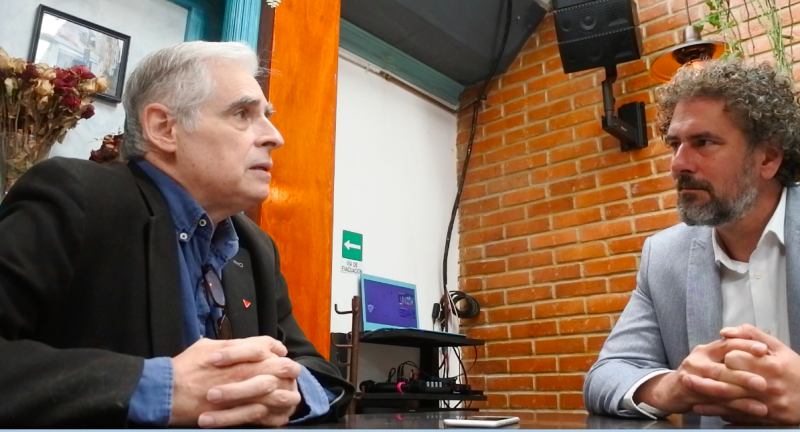
Let us begin with the topic of narco trafficking. What is the role of narco in politics?
Let me say that very clearly: narco could not have functioned without the coexistence of certain groups in politics. There are certain regions, where narcotrafficking plays a strategic role. This is a fact.
The federal state of Tamaulipas is an example. That Mexican state at the U.S. border has traditionally been strongly linked to drug trafficking. The last 4 governors of the state are either arrested or persecuted for connections to narcotrafficking.
Until recently, a mister by the name of Fransisco Cabeza de Vaca, a strategic ally of former President Felipe Calderón governed the state. Now, in the last years election, MORENA won the governor elections with great margin. But the old regime tried to pursue an operation to rob the election, spending huge amounts of money on election day.
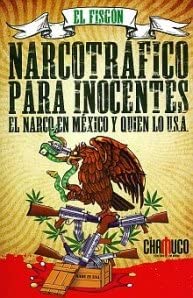
When they faced the electoral defeat, they even reacted with violence. But we are seeking further to disrupt the links between political power and delinquency. And we are beginning to have success.
Where do you observe success?
After a long and forceful effort, we see that the rate of delinquency is declining. During the Calderón’s presidency, that rate increased by 200%, during Pena Nieto’s by 50%. Now, it is the first time that it started to decrease.
Behind that is a new policy: responding to the cause of crime, attending the mechanisms of money laundering and cutting the narco’s ties to politics.
But the connection between narco and political power is not limited to Mexico. This also has to do with the United States.
Where do you see that connection?
First of all: We do not have the smallest doubt on the following: The dimension of narcotrafficking in Mexico cannot be explained without taking the United States into account. Both in terms of national politics and global economics.
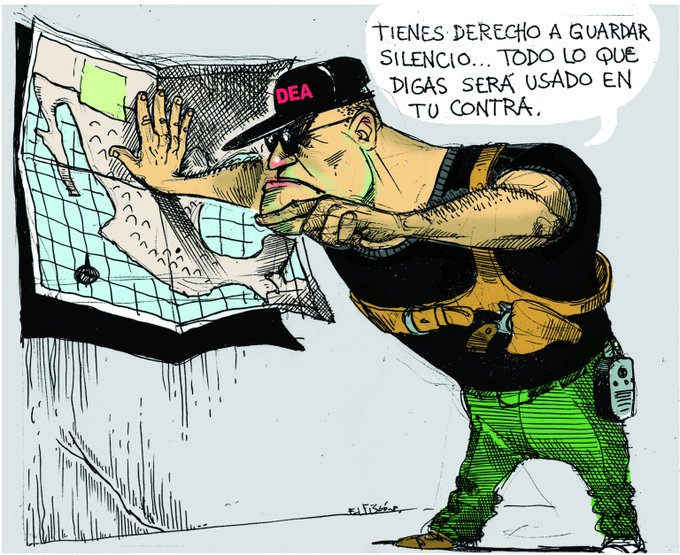
The great part of the income from narcotrafficking does not stay in Mexico. It goes to the United States. 1 Kg. of cocaine has a price in Colombia, another in Mexico, and an entirely different one in the U.S.
Formerly, all the policies that the State Department or the DEA (US Drug Enforcement Agency, YS) have applied against narco were connected to how politics were functioning in our country.
In the United States, there is the talk of narcoterrorism. What do you make of that expression?
The United States have used the fact of narcotrafficking and the idea of so-called narcoterrorism as an excuse to intervene militarily into countries.
This started when Nixon declared the ‘War on drugs’. He assumed the unsustainable idea that fighting drugs is easier where they are produced that where they are consumed. That idea does not work, because it is the consumption that causes the production. As long as consumption continues, production will occur somewhere.
But with that pretext, the United States intervened into various countries of Latin America and elsewhere.
The term narcoterrorism appeared in the beginning of the 21st century connected to two factors:
First was the attack on the Twin Towers on 9/11. From then on, ultra-conservative circles in the U.S. tried to connect narco-terrorism with groups of the left. Their best example was Colombia, where leftist guerilla groups were protecting areas of drug production.
But the truth is that narcotrafficking groups are tied to financial actors and economic interest groups – far away from leftist actors.
And secondly, they used this term narcoterrorism, because if they were to establish it as convincing, that is, in convincing that a certain group is narco-terrorist, then they would have the legitimation for a military intervention.
Therefore, is a cartel is accused of being a narco-terrorist, the country where it is located becomes a target for a military intervention. This is of course not a small thing.
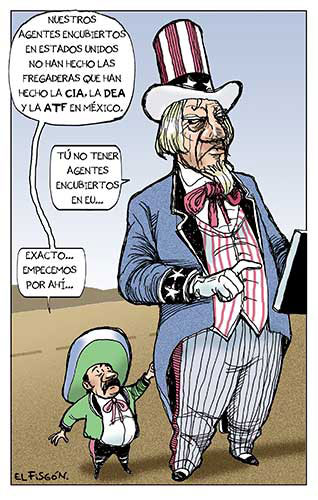
– You must not have any secret agents in the United States
– Exactly. Let’s begin with that.
Does that discourse target Mexico?
Yes, of course. If that discourse and expression is established in law, there is a serious threat of US military intervention into Mexico.
Now, to get make it clear. These cartel groups are not terrorists. They are criminals. That is an important difference.
Mexico has limited US anti-narco activities on its soil. Why?
Yes, Mexico did that, and it has created a lot of tensions. These North American agencies, such as the FBI, the DEA and so forth, had been very active in our country. And we observed frequently how they themselves committed acts of crime. There are several examples of that. Just to give you two of paradigmatic kind:
The DEA agent Kiki Camarena was assassinated in Mexico. Upon that, several important cartel chiefs, among them Caro Quitero and others were imprisoned. And the DEA started the famous Operacion Leyenda in our country. But at the end, it was documented that Camarena was tortured and killed in presence of a CIA agent! Héctor Berrellez, who led the Operacion Leyenda, stated that a CIA agent had – effectively – killed Camarena.
Another one is the US government institution ATF, Alcohol Firearms Tobacco. The ATF has introduced a huge number of firearms illegally to Mexico. Their excuse was they wanted to observe how arms trade was working. And that operation was done without the knowledge of the Mexican government! This is an illegal, criminal act.
And then there is the matter of drug consumption..
Look, the U.S. has every tool in order to control the drug market. They are the biggest consumer in the world. Approximately 50% of all drugs are consumed in the United States. And at the same time, they are the world’s policemen.
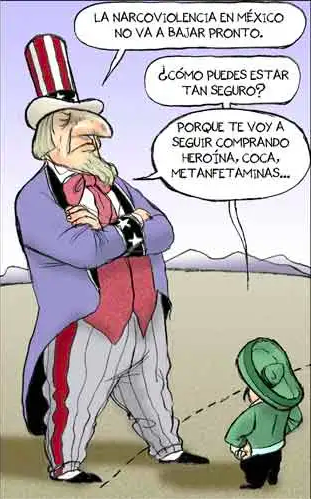
– How can you be so sure about that?
– Because I will continue buying the heroine, cocaine, methaphetamines..
There is the investigator Alfred McCoy, who has documented that all the drug cartels established after World War II have armed themselves essentially with Washington’s support. McCoy shows that all policies and strategies to fight drugs have served Washington to finance its dirties activities. A well-known example is the Iran-Contra-Affair – but its path also crosses through Mexico!
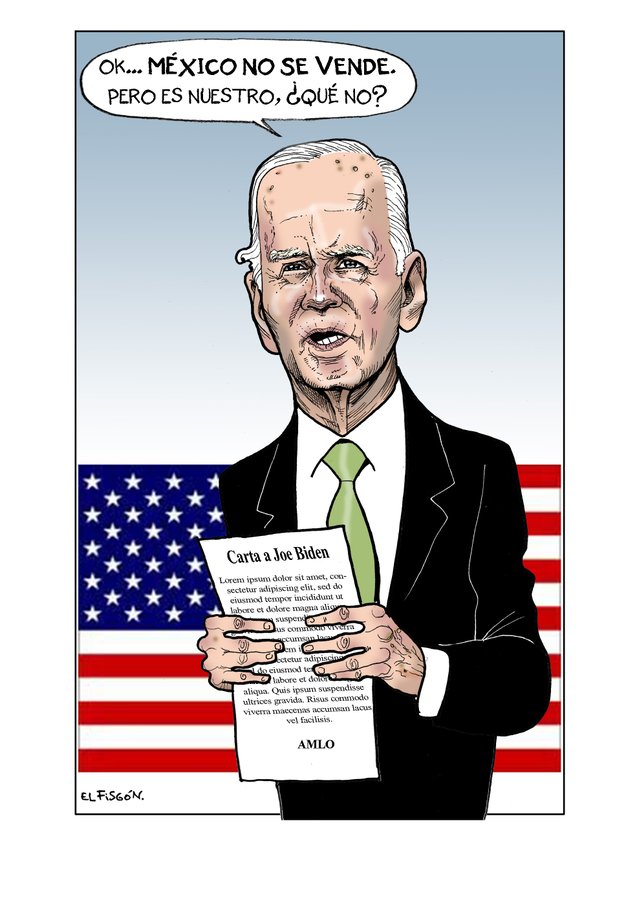
What can Mexico do?
What President Andrés Manuel Loopez Obrador is already trying to do: limit the activities of North American agencies on Mexican soil, address the roots of the problem, punish the white-collar-actors and the money laundering. This is not a small thing.
What the government of Mexico is already trying to do is to rescue national sovereignty in regards to security.
This implies to expel those US agents, addressing the topic of drugs as an illness rather than a crime. And it implies to follow the path of the money. It implies to place the well-being of Mexican people above the business.







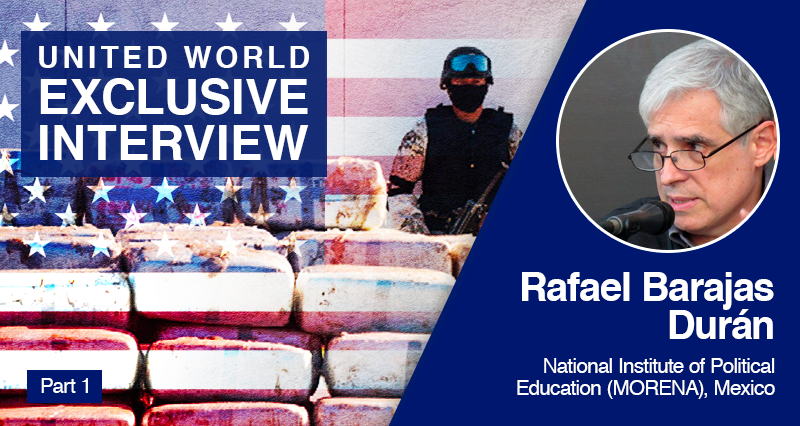









Leave a Reply